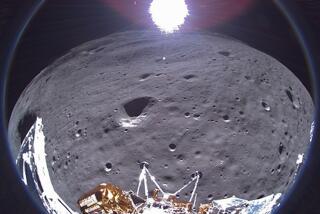Experts Expect Lucid to Be Very Tired, Wobbly
- Share via
After 188 days in space, Shannon Lucid is going to be a little wobbly on her legs, lightheaded and very, very tired, researchers said Thursday.
Experience from previous extended space missions suggests that it may take eight weeks for her to fully regain her balance, and longer still to restore the 20% loss of muscle mass that has been encountered on previous missions, according to Dr. Dan Feeback, who heads the Johnson Space Center’s muscle research laboratory.
But overall, the flight should leave no lasting effects, according to Dr. Lawrence I. Sinoway of Pennsylvania State University’s Milton S. Hershey Medical Center.
Although researchers still have only limited experience with the medical effects of extended space missions, results from U.S. Skylab and Russian Mir studies--as well as periods of prolonged bed confinement on Earth--suggest that four areas offer the greatest concern: the cardiovascular system, the neurovestibular system (which controls balance), muscles and the skeleton.
In the micro-gravity of space, Feeback said, “fluids go to the head, not the lower body like on Earth.” The body thinks blood pressure is too high and responds by excreting more fluids and reducing production of red blood cells.
When the astronaut returns to Earth, the blood goes back into the lower limbs and he or she might feel lightheaded when standing up or moving suddenly, Feeback said. Because of the reduced volume of oxygen-carrying red blood cells, about 12% to 15%, the astronaut will also be slightly anemic and fatigue easily.
The neurovestibular system, which tells us where we are with respect to our environment, “is absolutely dependent on gravity,” Feeback said, and is useless in space. When it begins to work again on landing, it over-responds.
The astronaut receives mixed signals from the system and will be wobbly for as long as eight weeks, especially when his or her eyes are closed or when he or she moves suddenly, said Dr. Jacob Bloomberg of the Johnson Space Center in Houston.
Muscles that are not used in space will atrophy as much as 20% during a mission the length of Lucid’s, Sinoway noted. The effect is most pronounced in muscles of the back and legs, which are normally exercised all the time on Earth when a person sits or stands.
Unless the astronaut takes specific steps to exercise these muscles in space--Lucid used a treadmill daily--they get little or no use. The astronaut who returns from space therefore will be weaker than normal and fatigue easily until muscle mass and tone are restored, Sinoway said.
Finally, astronauts have been shown to lose as much as 1% of bone mass for each month spent in space. The loss in a four-month flight “isn’t earth-shattering,” Feeback noted, but could be a problem if it were concentrated in crucial weight-bearing areas.
Sinoway noted that women are more predisposed to bone loss than men, but said that there has not been enough experience with spaceflight among women to determine whether their bone loss will be more severe.






